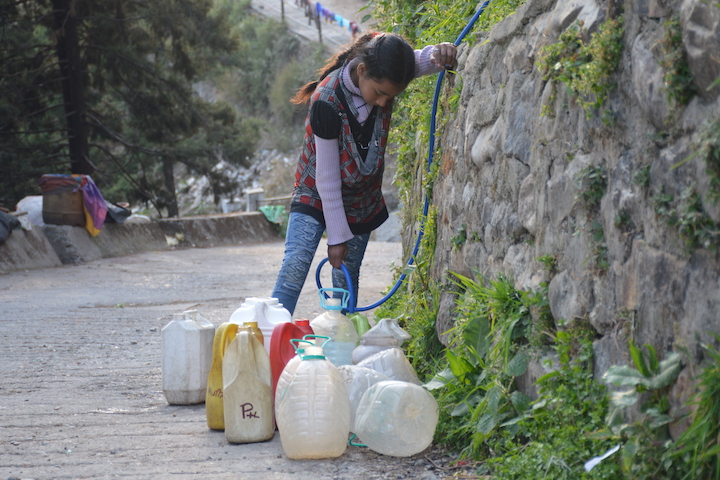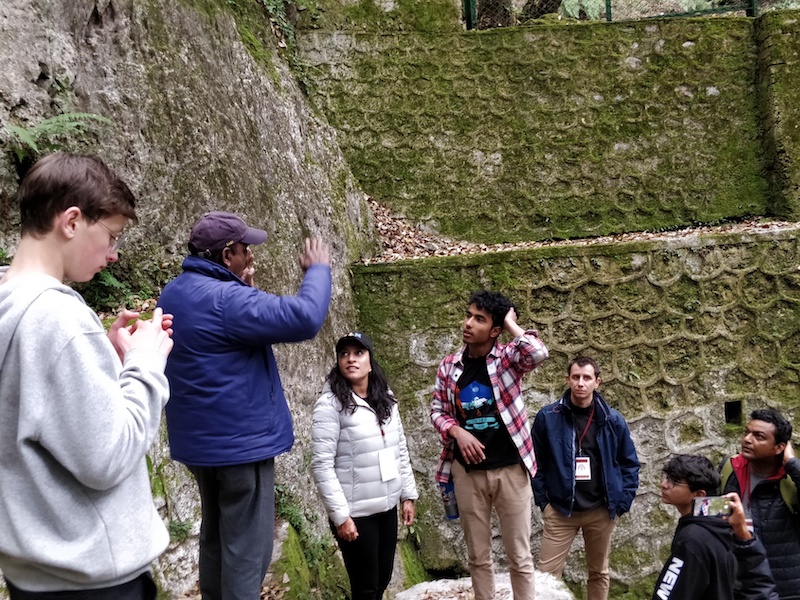
30 Aug Woodstock needs a watershed moment
Our student water conservation team works with the local community to tackle water scarcity in and around Woodstock and Mussoorie. Cofounder Dhrubhagat from the Class of 2020 identifies the pressing issues facing us around water conservation, and some of the practical solutions the team has identified to help Woodstock become more efficient in, and conscious of, its use of water.
Over the past summer months, India has faced sever water crisis: Chennai and Ladakh have almost dried up. Throughout the country, millions are falling sick and dying due to the unavailability of water in their region. In Mussoorie itself, we have numerous slums, like the one my team and I visited last year, that rely on one single tap for hundreds of families.
"With our school’s current water consumption trends, we consume too much of the entire pie and leave only the crumbs for the communities downstream. We simply can no longer operate like this."
The struggle for water is a universally pertinent issue. Woodstock School is lucky enough to be able to outsource most of its water demands from a single spring: Midlands Stream. While this has served the school well, the overconsumption of this spring has led to numerous implications on the wider Mussoorie community. Water in India, in every form, is a state resource –meaning that it is open for everyone to consume. Private stakeholders should not monopolize water sources.

Members of the Student Water Conservation Team visiting Midlands Stream, the primary source of water for the Woodstock community.
But with our school’s current water consumption trends, we consume too much of the entire pie and leave only the crumbs for the communities downstream. We simply can no longer operate like this, and that is precisely why my team, the student water conservation group, have come together to take action on this issue.
We wish to uplift Woodstock’s guiding principle of ‘treading lightly on the Earth’. We feel as if it were time for students to fully submerge into environmental activism, especially because our Mother Earth grows wearier every day due to our senseless, unrestricted consumption of her natural resources. Here are some of our biggest projects, either completed or in the works, so far this year:
Firstly, we have the Mussoorie Student Water Forum. This was originally formed as a subset of the Mussoorie Water Forum, a gathering of concerned citizens, politicians, and businesspeople in Mussoorie, to tackle issues of water scarcity. After attending these sessions, we learned that there was no true fruition in these meetings. So, instead, we proceeded to form the Student Forum, which hosts a consortium of schools around Mussoorie, regardless of socioeconomic class, to collectively fight water issues.

Collecting water from shared taps is the reality of many people’s lives in Mussoorie, and Woodstock can have an important role to play in reducing water scarcity in our community.
One of our biggest on-going projects as a Forum is the tracking of leakages in city supply lines across the hillside so we could compile a detailed report and send it to the Water Works department in Mussoorie. Additionally, Woodstock is also working to tackle leaks in its own water system, with work underway to replace old pipelines expected to save a significant proportion of water wasted before it gets to the end user.
"We are a group of young enthusiasts working to make Woodstock and Mussoorie a healthier environment, for we believe that a Woodstock education commands you to apply what you learn in the classroom to the real world."
Secondly, we are working with the estates department of the school to create a rainwater harvesting supplement to Midlands (the high school girls) dorm. The school currently has a 500,000 litre rainwater tank that is currently not in proper usage and we have partnered with engineers at Woodstock to supplement this tank to toilets on one side of the girls’ dorm so we lessen our consumption from Midlands stream. This is currently a pilot project and will soon be built to make the dorm eco-friendlier.
Finally, we are working on aquifer restoration techniques by creating water catchment systems along the hillside. We are partnering with CEDAR, an environmental NGO in Dehradun, to give us scientific advice on how to build catchments so we can replenish our springs in the long run. The idea is to build ditches so rainwater can seep into the soil and replenish our water aquifers in the long run – this will also help students to get physically active with service.
Additionally, we also host educational sessions with students regarding this issue and work with administration to find have more effective, green policies on water timings. One way we are trying to do this is by incrementally reducing hot water timings for the dorms. Thus, this would make it easier for students to adapt to this change and will equip us better for the dry month of May.
We are a group of young enthusiasts working to make Woodstock and Mussoorie a healthier environment, for we believe that a Woodstock education commands you to apply what you learn in the classroom to the real world.
We have the drive and energy but would greatly appreciate any guidance from the esteemed parents and associations of Woodstock School. If you have any words for us, please feel free to email me at dhrubhagatsingh@woodstock.ac.in.
Dhrubhagat Singh, Class of 2020
Dhrubhagat is co-founder of the student water conservation team and editor-in-chief of The Woodstocker






Arun Kapur
Posted at 20:29h, 08 SeptemberWater conservation is the need of hour. A very laudable step. All the best.